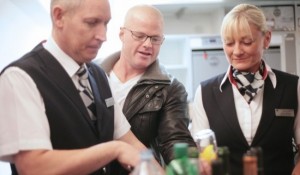 While trying to escape the business world for a few hours last evening (aka “male channel surfing”) I happened upon a Heston Blumenthal TV program on Channel 4. Kudos to Channel 4 for producing Heston’s Mission Impossible. It’s a must watch for those interested in innovation. Period.
While trying to escape the business world for a few hours last evening (aka “male channel surfing”) I happened upon a Heston Blumenthal TV program on Channel 4. Kudos to Channel 4 for producing Heston’s Mission Impossible. It’s a must watch for those interested in innovation. Period.
The program is all about Heston’s efforts to dramatically improve the food on British Airways. Wow, a good start, it’s an iconic brand, and a brand in trouble. The program concept is not new; Blumental made a similar effort to update the menu at Great Britian’s classic diner, Little Chef. What is new, and very worth watching if you are an innovation person, hell, a business person, is the clarity of the program as an innovation case study. Really, the program is so good it should be used in business schools, because it’s all there: company in distress, desire to change, daunting constraints, fear, feelings of ‘impossibility’, resistance by employees, in-the-box evaluators, denial of facts, visionary thinking, insightful research, failed experiments, attempts to compromise a good solution, and thankfully, ultimately, success. You can watch the show online.
Anybody who flies knows that airline food, even in first class, is pretty bad. Food that must be cooked is usually tasteless, dried out, overheated, and you’re lucky if it’s just blah, and not downright awful. And this has been the case nearly forever, and I’m sure many attempts have been made to cross the chasm from mediocrity to excellence, and those attempts have routinely failed. “Mission Impossible” — it’s apt. And yet, in big problems there are big opportunities. Good food on an airplane is enough to justify higher ticket prices. The airline that can claim “good food” is going to win big in the marketplace, it’s a real differentiator and reason to buy. Hats off to BA for taking the risk.
I won’t go through every element of the program, but it could easily be the center-piece of an MBA workshop on what happens when people try to innovate. At times I was shaking my head in wonder as I watched people with good intentions totally try to subvert a valiant effort to change and innovate. It’s interesting that impatience alone is a huge barrier to innovation. Clearly, Heston Blumenthal is an expert with a reputation for solving tough problems, a good start eh? Further, he’s motivated, he wanted to help BA for patriotic reasons (and I’m sure a nice check). And yet, in spite of all sorts of compelling evidence, we see an intelligent airline chef denying factual data, we see a BA tasting panel taste-testing under non-flying conditions, we see limits being put on experimentation, we see a lot of short sighted thinking, and lack of patience! — and there’s so much more in this program. Professors of innovation, play the tape, stop, talk, discuss, play the tape again — so many lessons.
Blumenthal, through science, persistence, charm, expertise, experimentation, and salesmanship, ultimatly delivers a great dinner in the air. It’s a real learning, an eye opener even for me, about what it takes to pull people forward into innovation — even with a solution in hand! Imagine how hard it is for a non-celebrity, insider at a company, to innovate. Even with vision and a good idea, to get a breakthrough innovation implemented almost requires celebrity status. It gives one a huge pause for thought.
What to do?
If I’m in management, the lesson is in supporting your visionaries and not settling for an incremental improvement. If I’m an innovation team member, the lesson(s) are questioning assumptions (even in the face of “religious” beliefs), persistence, selling ideas, and providing proof. Maybe also working for an organization that isn’t just paying lip service to innovation. It’s easy to see why visionaries quit; it must be incredibly frustrating.
This program is actually a series. I plan to watch every episode, and I could care less about food. This is a program about innovation process. If that topic is of interest to you, watch it, watch it, watch it. And thanks Heston, entertaining to boot!


